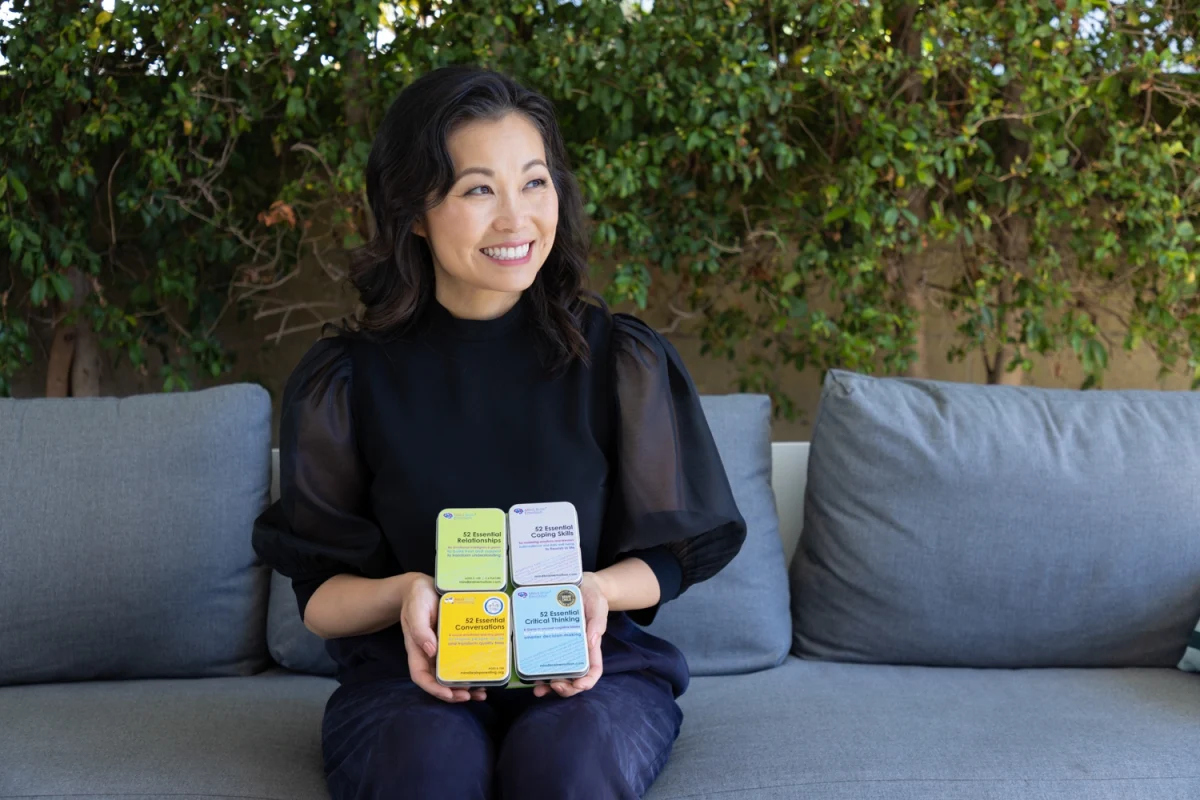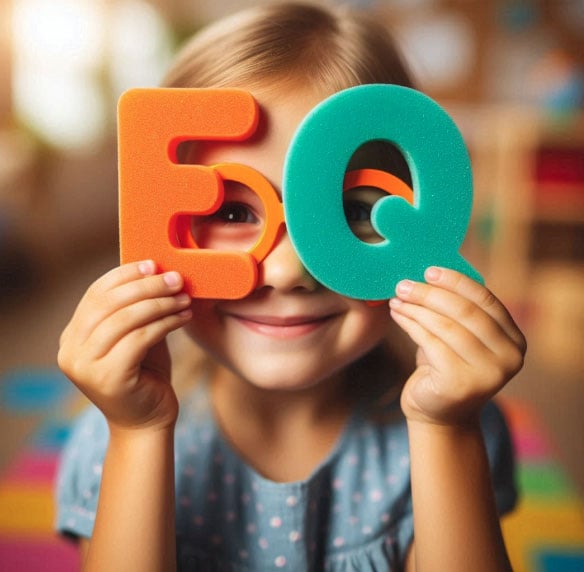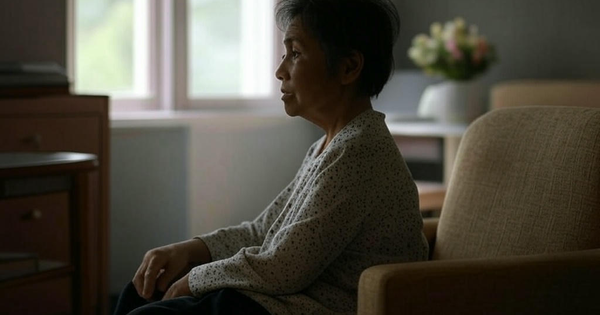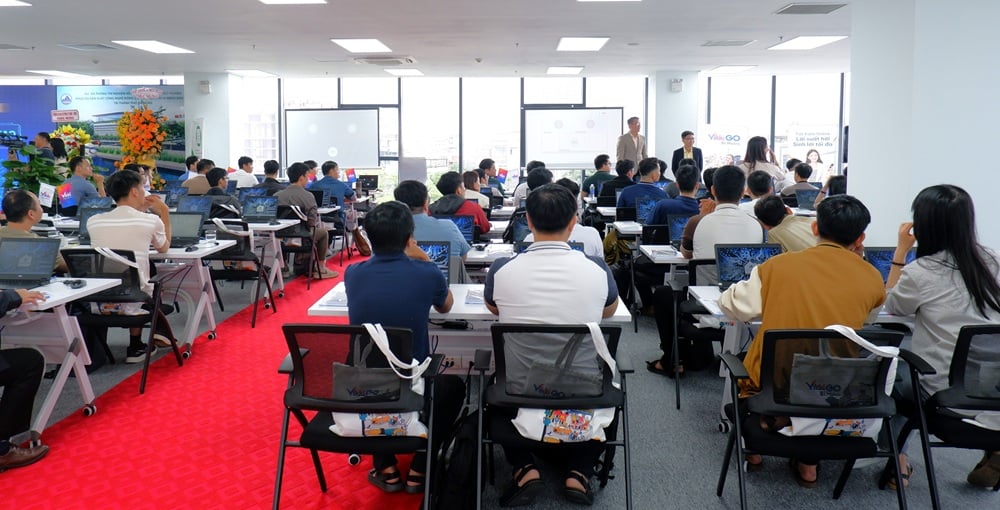GĐXH - As a mother of three, Harvard-trained educator Jenny Woo understands how difficult it is to raise a child with high emotional intelligence (EQ).
Jenny Woo is an educator, EQ researcher, CEO of Mind Brain Emotion trained at Harvard University, USA.
She has created many educational games and mental health tools to help children and adults develop essential skills.
At the same time, Jenny Woo is a mother of 3 children, so she has practical experience in raising children. She understands the difficulties in raising a child with high emotional intelligence.
For Jenny Woo, it’s about learning how to best support her children’s needs, and her own. Here are three phrases she uses regularly to help her children develop high EQs.

Education expert Jenny Woo.
1. "How are you feeling right now?"
When children throw tantrums, part of the reason is that they don't have the vocabulary to express themselves.
Therefore, it is the parents' job to help children better understand their emotions by teaching them more words to describe personal feelings.
For example, children who say they are “sad” may actually feel lonely, embarrassed, or misunderstood. Parents can help their children identify and express their emotions more specifically by teaching them words like “frustrated,” “disappointed,” or “worried.”
In addition, adults can incorporate emotional vocabulary into their daily routines to further strengthen children's self-awareness.
For example, while listening to or singing a song, describe the emotions the song evokes in your child. When watching a TV show together, talk about the emotions the characters express – and how your child would feel in a similar situation.
At the end of the day, talk about the emotions your child experienced that day.
The biggest mistake Jenny Woo observes is that parents often label emotions as “good” or “bad.”
Instead of judging a feeling, parents should focus on helping their child understand what the feeling reveals about their values and needs.
2. "I see you're not in a good mood today, but it's okay."
As parents, we often feel pressured to stay calm and hide our emotions, but this can set an unrealistic standard for our children.
Ironically, the more parents suppress their emotions, the more likely it is that it will trigger a screaming outburst.
Parents must model healthy emotional expression by sharing their feelings in ways that their children can understand.
This doesn't mean overwhelming children with parental issues, but showing that it's okay to feel a range of emotions and discuss them openly.
For example, if you are angry about something, instead of hiding it or pretending nothing is happening, be honest about your upset with your children.
When parents openly express their emotions, they are demonstrating to their children that it is okay to have strong emotions.

If parents are a reflection of their children, then conversely, children are also a reflection of your parenting ability. Illustration photo
3. "Your feelings are real, they are valid"
Parents need to pay attention to their children's emotions by adjusting with them.
Accordingly, do not belittle a child's petty emotions with dismissive phrases like "just bear with it" or "it's no big deal." To a child, emotions are very real and can take over their minds.
Here are some tips Jenny Woo recommends to help children and adults deal with difficult situations:
- Take a slow, deep breath in through your nose. Imagine you are gathering all the unpleasant feelings. Exhale and imagine yourself blowing those feelings away like dark clouds. Think: "Inhale calm, exhale storm."
- When you think about something embarrassing you did, add silly details and turn it into a joke.
- Humming a tune can calm an angry mind.
A child who can identify emotions, be listened to, and empathize can also accurately perceive the feelings of others.
At a certain point, children become aware of how their behavior affects the feelings and thoughts of those around them.
When children can stand on the other person's point of view, it shows that they have the ability to grasp, empathize and handle conflicts peacefully.
This is a good habit needed for future life.
Source: https://giadinh.suckhoedoisong.vn/chuyen-gia-dai-hoc-harvard-tiet-lo-3-cum-tu-minh-hay-noi-voi-con-de-giup-tre-tang-eq-172241202102032398.htm





![[Photo] Schools and students approach digital transformation, building smart schools](https://vstatic.vietnam.vn/vietnam/resource/IMAGE/2025/3/29/9ede9f0df2d342bdbf555d36e753854f)
![[Photo] Unique Ao Dai Parade forming a map of Vietnam with more than 1,000 women participating](https://vstatic.vietnam.vn/vietnam/resource/IMAGE/2025/3/29/fbd695fa9d5f43b89800439215ad7c69)
![[Photo] Brazilian President visits Vietnam Military History Museum](https://vstatic.vietnam.vn/vietnam/resource/IMAGE/2025/3/29/723eb19195014084bcdfa365be166928)























































































Comment (0)